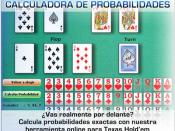Lou Krieger, a famous poker player once said, "Poker is a microcosm of all we admire and disdain about capitalism and democracy. It can be rough-hewn or polished, warm or cold, charitable and caring or hard and impersonal. It is fickle and elusive, but ultimately it is fair, and right, and just." Poker, by definition, is a card game played by two or more persons, in which players bet on the value of their hands, the winner taking the pool. Over the past several years, poker has changed dramatically, becoming increasingly popular not only in the United States, but around the world as well. I would like to do my research on the men and women who spend countless hours at the casinos and poker locations around the Tampa Bay Area. I would like to study and truly understand just why this game is so addicting and played by millions of people all around the world.
Poker has recently made the evolutionary jump from being viewed as a game to being viewed as a sport in the United States. In my research, I wanted to find out why not only so many people have started playing, but why this game is so addicting. I did this by traveling to numerous poker clubs around the Tampa Bay Area interviewing as many people as possible. I wanted to get a wide variety of answers, so I tried to interview a mix of people according to age, race, and gender. My subjects were men and women who played poker for fun, as well as people who played poker to make a living. These individuals ranged from seventeen years old to eight five years old, playing on an average of between two to 60 hours of poker a week. Once inside these establishments, I sat down next to these men and women and engaged in full conversations about their poker background and experience. The most interesting part of my research was that all of these people, not matter how old, were all so different, yet the common ground of poker brought them all together: for better or for worse.
The mainstream acceptance ok poker is due to increased media coverage of high-stakes poker tournaments such as the 2003 World Series of Poker and various weekly tournaments on the World Poker Tour. While ESPN and The Travel Channel have provided the primary coverage of such events, other television stations have been quick to duplicate these efforts. The concept of "anybody" winning caught hold of the American public very quickly, and almost overnight the number of people trying to become that "anybody" exploded. Thus, it wasn't long before people who had a few dollars and a couple of free hours began trying their hands at a game that, with a little luck, could make them wealthy overnight.
The exact origins of poker are unclear. It seems to have originated from a 16th century Persian card game known as As Nas (wikipedia 1). This game was played with twenty five cards with five different suits. The game played in a similar fashion to modern 5 card stud and possessed similar poker hands rankings, such as three-of-a-kind. When Europeans began to play the game, they called it "poque" or "pochen." While poker's origins may lie in Europe and Persia, it truly developed in the United States. Poker was first widely played in New Orleans in the early 1800's. Prior to the American Civil War, poker spread quickly from New Orleans to towns throughout the Western frontier. Poker's spread was the result of a general spread of gambling during the era. The West was comprised largely of speculators and travelers, both groups that enjoyed gambling. Gambling suited the speculator's individualistic and risk-taking traits. Relieved by family needs and the social disgraces of Southern and Northern culture, travelers were allowed to indulge in this vice for their own entertainment. (poker room 3) Gambling was viewed to be comprised of two distinct groups. There was the player, who was considered to be a gentleman who enjoyed this form of entertainment in moderation, and there was the professional, who played simply to make money without any regard to moderation or good manners (Poker history 2). Professional gamblers were considered to contribute nothing to society. The public viewed their practice as nothing more than one man trying to con another out of his hard-earned money. This was especially the case because professional gamblers often cheated in order to win money from their victims.
Poker initially was played with one round of betting. Players were dealt five cards face down and there was no draw of cards. Professional gamblers later modified the rules in order to enhance the profitability of the game for them. In1850, wild cards and bluffing became common practices in the game. A pure bluff, or stone-cold bluff, is a bet or raise with an inferior hand that has little or no chance of improving. A player making a pure bluff believes he can only win the pot if all opponents fold. The draw was also added. The addition of the draw helped professionals because it introduced another round of betting as well as introducing more skill to the game (Poker history 1).
Poker playing became increasingly popular as American gambling shifted from the frontier towns to the riverboats. The Western, frontier culture of these towns was slowly replaced by Southern culture, which was more averse to gambling. Western towns passed ordinances against gambling and many towns kicked out known gamblers. (Poker history 4). Some gamblers were tarred and feathered and there were even instances where groups lynched and killed gamblers. Since their trade was no longer tolerated on land, professional gamblers took their trade to the many steamboats navigating the Mississippi River. However, carrying heavy equipment like a roulette wheel proved more difficult aboard the steamboats, so card games like poker became an increasingly popular game of choice for gamblers. (Launch poker 1)





